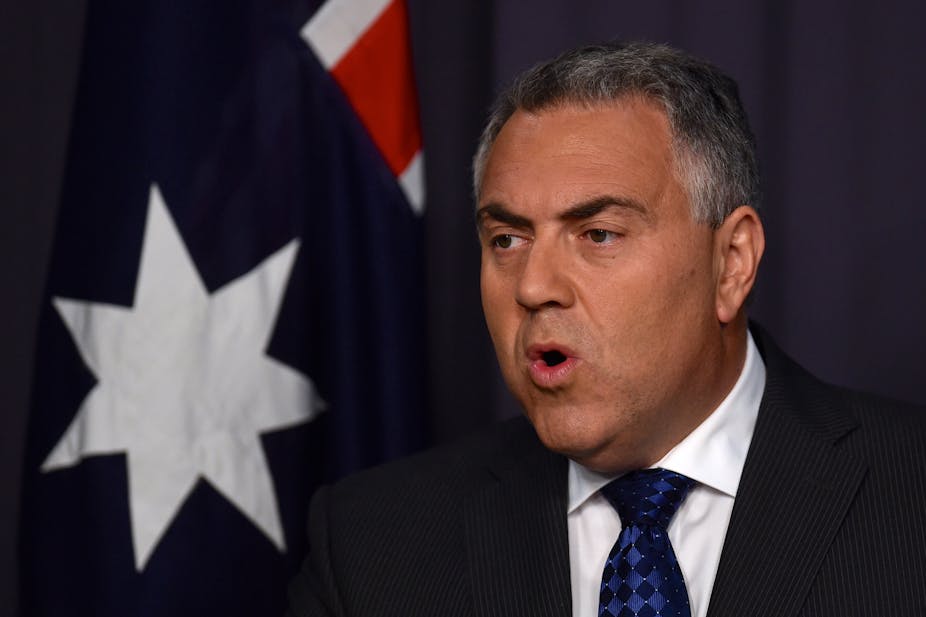Whenever an Australian government runs into trouble we hear calls for a clearer narrative. The latest contribution comes in a thoughtful article from Waleed Aly.
Aly points to the similar undermining of our last three prime ministers, all of whom seemed unable to combine public trust with the respect of their colleagues. And all of whom, he argues, sacrificed principles for short-term expediency.
Tony Abbott won office because of the seeming dysfunction of the Rudd-Gillard-Rudd governments, having held his party together through the repetition of simplistic slogans and promises to maintain government programs, which are now under threat.
This tactic has paid off handsomely for oppositions across the country. The exception is the South Australian Liberals, who failed to unseat the Labor government last year. It follows the pattern across Western democracies; the only major political survivor is German Chancellor Angela Merkel, who has held office since 2005.
Such longevity now seems almost an aberration; maybe many Australians support the monarchy from a sense that it survives the short-term nature of the political process. Calls for a convincing narrative are common across the Western world, as traditional political parties struggle to reposition themselves in a rapidly changing environment.
Parties struggle for consistency
Australian political parties emerged as essentially class-based. Labor, centred in the unionised workforce, faced a series of conservative parties representing business, which were able to appeal to those who identified as middle class and maintain an alliance with the rural-based Nationals. Since the Second World War no minor parties have been able to break the dominant story of politics as built around class and the role of the state, though the Greens have come closest.
As the workforce has changed radically – more women, fewer blue-collar workers, an expansion of service jobs and small businesses – so too has the nature of political discourse. An increasingly complex society demands more of the state while the dominant language of neoliberalism means constant pressure to reduce taxes and the ability of governments to deliver.
The Hawke-Keating Labor governments introduced a number of neoliberal measures, but with some concern to maintain safety nets and keep the union movement on side. The Howard Coalition government was able to introduce a GST, one of the most far-reaching tax reforms of the past few decades. But it squandered much of the gain from the minerals boom in unnecessary perks for well-off voters.
The call for new narratives is in effect a call for greater honesty about the role of the state. Treasurer Joe Hockey touched on this when he declared the “age of entitlement” over. Yet he then failed to acknowledge that a balanced budget requires far greater cuts to the benefits built into our tax system – for example, superannuation tax breaks and negative gearing – than his constituency would wear.
Reducing the big issues to individual impact
Thirty years of neoliberal rhetoric has poisoned political discussion, by reducing major issues to immediate impact on individual incomes. Abbott’s sustained attack on the carbon tax, which was designed to help combat climate change, drowned out sensible discussion of the bigger issues.

Labor is following suit in not acknowledging that to maintain and improve government programs will require a major overhaul of taxation. While the Gillard government took some important steps towards shifting the balance, particularly through the national disability scheme and greater funding for schools, she failed to explain clearly that this would require greater government revenue.
The current Coalition government has sought to spell out the costs, but its solutions are so clearly short term and biased in favour of the well-off that they have backfired.
Menzies and Howard benefited from a growing economy, which allowed them to satisfy their supporters without inflicting too much pain. With an ageing population and a slowing global economy, it is less clear how a party deeply connected with the interests of business can retract some of its most unpopular promises and pay for increasing demands on government.
A Labor narrative would involve a coherent defence of the continuing role of the state. This would be, in effect, a return to the ALP’s social democratic roots (as Andrew Scott has argued in his book Northern Lights). Not only has the ALP ceded important moral ground to the Greens – especially in the case of asylum seekers – but the party has failed to construct a meaningful story about creating a better society which voters might trust.
For both sides a better narrative means more than a set of specific policies and promises of government savings and reform. It means restoring trust in the ability of government to deliver what we cannot deliver for ourselves. And that requires a defence of the public sphere, which neither side seems able to articulate.
Other articles in The Conversation’s ongoing series, “New Politics”, can be read here.

